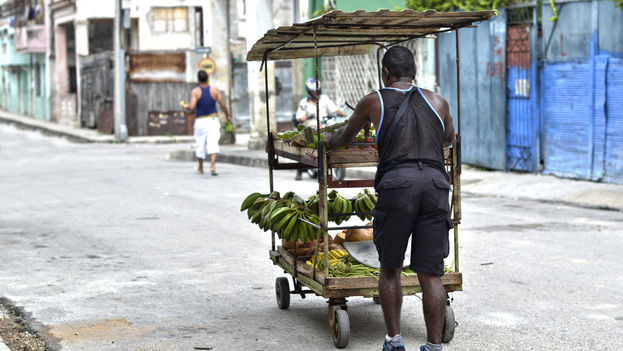
![]() 14ymedio, Havana, 16 January 2016 – A price control experiment began at the start of this year in Cuba’s Artemisa province, with the sale of agricultural products “at maximum fixed prices” in 13 new markets and bodegas. The amounts of merchandise are regulated by the Provincial Administrative Council, according to Teresa Martinez Mendaro, its chief.
14ymedio, Havana, 16 January 2016 – A price control experiment began at the start of this year in Cuba’s Artemisa province, with the sale of agricultural products “at maximum fixed prices” in 13 new markets and bodegas. The amounts of merchandise are regulated by the Provincial Administrative Council, according to Teresa Martinez Mendaro, its chief.
Under the euphemism “variable pricing” the official press announced the start of this pilot project in a market in every municipality in the province, with two such markets in Bauta, San Antonio and Artemisa. Although the points of sale belong to the Basic Unit of Commerce, they are now supplied by agricultural enterprises through Acopio, Cuba’s State Procurement and Distribution Agency.
This week the stands at the designated establishments offered taro, sweet potatos and carrots at a price not to exceed one Cuban peso per pound (CUP, about 4¢ US), a price below that in the markets operating according to supply and demand. Peppers and tomatoes have a regulated price not to exceed 5 CUP per pound, while elsewhere these foods can reach prices of 10 CUP and 25 CUP respectively.
Some of new markets opened their doors in the first week of January, as was the case with the La Vizcaina market in Alquizar. Residents of the area expressed relief, this Friday, at the low prices for food and vegetables, but were also cautious about the measure.
“The idea is good, but I worry that the quality of the products will fall greatly with these prices,” said Gabriela, a young woman who lives near the Alquizar market. A market employee didn’t hide his reservations, “We get little merchandise and we run out early,” he commented to this newspaper.
The measure has not been welcomed by private and street vendors. For the 1,167 self-employed fruit and vegetable cart sellers of the province, these new markets represent fierce competition.
“It will be a question of waiting for them to fall out of favor,” predicts William walking his cart through nearby streets hawking bananas and other fruits. The man added, “The state can not maintain something like that because there is not enough production.”
The controlled prices are officially called “variable,” as they vary according to the season of the year, production costs, harvest volume and the value of the inputs used by the farmers.
The provincial authorities plan to strengthen the inspector corp to monitor the prices established in these markets.
The experiment began a few days after the last meeting of the National Assembly, where the issue of food prices was prominent in numerous discussions. In response to a complaint from several deputies, Raul Castro said that measures would be taken to bring prices in line with wages. The announcement put producers and intermediaries an alert.
